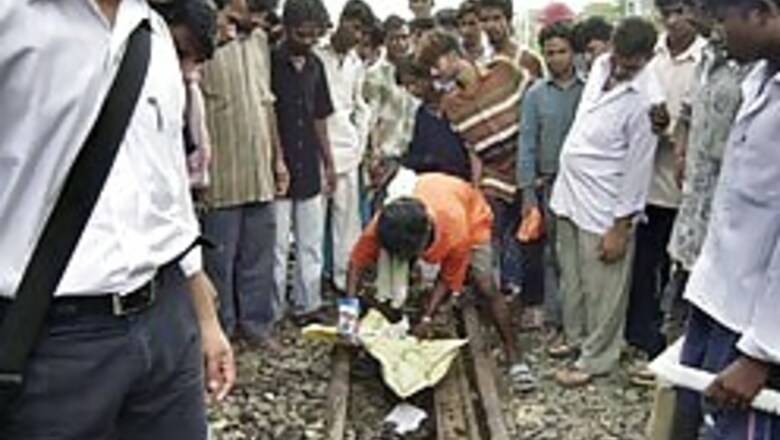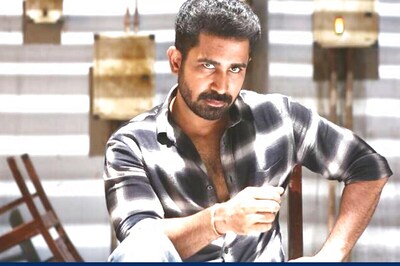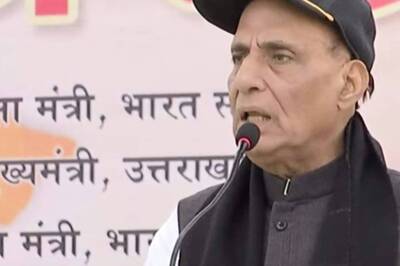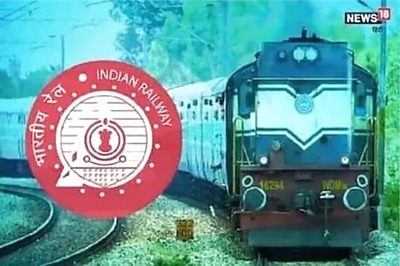
views
We thought a high tension cable had collapsed and people electrocuted - Citizen Journalist Saunak Ghosh shares a first-hand account of what happened at the Matunga station.
I would like to share my experience with you as a first-hand account of what happened at the Matunga station.
I was one of the passengers traveling in the first compartment (II class) in a Borivali-bound slow train, which I boarded from Lower Parel. The train was just entering Matunga station, when we heard a loud blast not very far away.
Panic spread immediately as the train halted and passengers poured out into the platform (people in the first few compartments as train was partially inside) and onto the open tracks.
We could see the fast train bound for Borivali on the track next to us, but slightly ahead (having just crossed the station). Pandemonium reigned supreme as people tried to find out what exactly was wrong.
The first reports that we heard was that a high tension power wire had collapsed and many people were electrocuted. We could see around five-six dead bodies lying right across the tracks in a mangled heap.
At this time, our train tried to move away from the station, which many people boarded to get away from the site. Then, some people came running in and yelling at everyone to get off the train as their lives may be in danger and it was also a call for help.
A couple of very shaken ladies came in to tell us that there had been a bomb blast.
A few of us rushed to the spot, while talking to some people around us to find out the current situation.
The scene was nauseating with human body parts and clothing strewn all over the place. Many volunteers were carrying mangled bodies in makeshift stretchers. Local people were at the scene first, getting inside the train and helping people out one by one.
There was a deathly silence except for the sounds made by the volunteers. People were simply too shocked to be a part of a scene which one usually sees on TV screens. But this was real.
Going forward, I went up the footbridge to join the several thousands of people who were witness to the incident. People were trying to pull down the barricade to make way for injured. Stretchers were being carried by all sorts of people.
The police then made their entry finally getting people to move out of the way and they were followed by ambulances and fire brigades.
They took charge of the situation allowing the volunteers to help the victims, while the bystanders were told to disperse or move to a distance which people obliged.
At this point of time it started drizzling, so I moved off from the station as there was nothing much I could do.
A look at police work outside the station shows how they were effective in cordoning off the road and helping the injured get to the ambulances.
Much as we love cop-bashing and blaming them for all that happened, they were putting their best foot forward.
All this time the phone network was totally clogged. Calls could not be made and messages could not be sent.
I am sure lots of people were frantically trying to get to their loved ones. I was traveling from Lower Parel to Vile Parle as I was going to visit my dad at the airport who was on a transit journey and on his way to Ahmedabad.
He left the city without the knowledge whether his son was fine and cursing himself all the time for asking me to come over.
One really can't blame the cell companies as we all know by now that they never operate at Full capacity as it would entail a loss at non-peak hours.
However, Reliance and MTNL did a much better job than Hutch at this fateful hour.
A point to ponder over: Thinking logically, what do terrorists, who were behind these blasts, gain from them?
Mayhem, madness and after all sheer terror in the hearts of people. All the blasts happened in first class compartments. Eight blasts in a span of 11 minutes.
The centres were Matunga, Mahim, Bandra, Khar, Jogeshwari, Borivali and Bhayendar. All important suburbs at the Western Line.
However, the two largest statsion in the suburb in terms of maximum damage which could have been caused to the people and spreading the terror would have been Dadar and Andheri.
Were these two stations missed or was it the trains, which were traveling slightly before time which saved the fate of these stations?
Thus if the above hypothesis were to be true, the blasts should've happened in
Dadar
matunga
Mahim
Bandra
Andheri
Borivali and
Bhayender
That would've caused maximum panic in the city as Dadar and Andheri together sees maximum of the Western Lines traffic. I hope this hypothesis is not ruled out and the intelligence gets to the bottom of this matter.
All this time, the people around the place showed great spirits in braving the rain and adverse situations to save their fellow Mumbaites. Hats off to them,




















Comments
0 comment